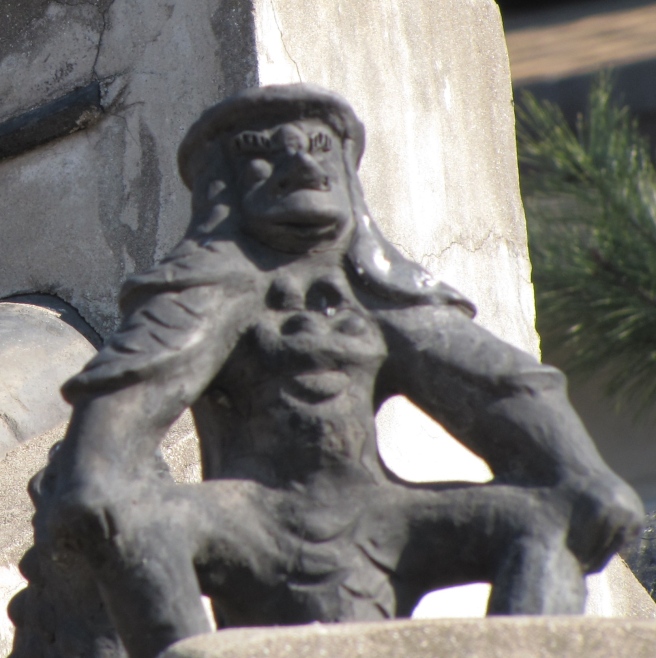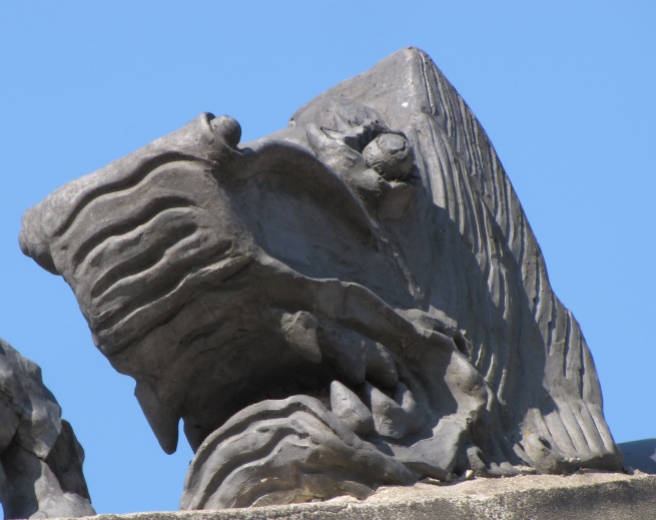First posted a year ago today…
A week ago today I went to a memorial service for a woman I first met in graduate school in New York City. She had been a fellow student in my department for a year or so before she disappeared. People dropped out of the program all the time, and I assumed that she, like so many others, had decided it wasn’t for her. Although we were never close, I was surprised and delighted to spot her familiar face in the choir loft of the church my husband and I began to attend when we moved to Charlottesville about four years later. I found her after the service and tried to reconnect with her by chatting about our department and about New York. My overtures were coldly rebuffed. I was bewildered, but gave it no more thought until the following Sunday when she found me and wordlessly handed me a handwritten note on a scrap of paper before walking away. In the note she told me that she had been forced to give up her studies because of her health problems. It was painful for her to talk about her time in New York, because it was a cruel reminder of everything she had lost.
“Thank you for your note,” I said the next time I saw her. She did not reply. I’m sad to say that these were the last words we ever exchanged. Over the years, I awkwardly smiled at her or waved as we crossed paths. She would make eye contact with me, but nothing more. I feared that the very sight of me made her unhappy. Our paths diverged further and further. I eventually finished my degree and began teaching in my field. My family rapidly proliferated. She grew sicker and ever more remote. I would often see her walking along the road on her crutches, always alone. I learned from her obituary that on top of her other health issues, she had been diagnosed with Asperger’s, which would explain some of the difficulty we had in interacting. From her obituary I also learned that she had graduated from Harvard with high honors, that she had a working knowledge of seven languages, and that she was a Chicago Cubs fan…Now she’s gone, and I’m left wondering if I should have tried harder to be a friend to her. If I had persisted, maybe I would have learned these things from her, rather than from her obituary. In the end, all I could do was show up for her memorial service.
It was a beautiful service given with love and compassion by our minister who knew her and appreciated her struggles, her strengths, her quirks and the essential goodness of her character. Knowing that she was unable to work, the church staff had appointed her as “adjunct staff.” She took care of things like folding the church bulletins, making sure the pencils in the friendship register were sharpened just so, and gathering up bulletins left behind in the pews to recycle. She volunteered at the hospital and for Emergency Food Bank, and many other places as well. The minister read a prayer for her called “For Those Whose Work is Invisible” by Mary Gordon from her series of “Prayers for the Unprayed-for”:
For those who paint the undersides of boats, makers of ornamental drains on roofs too high to be seen, for cobblers who labour over inner-soles, for seamstresses who stitch the wrong sides of linings, for scholars whose research leads to no obvious discovery, for dentists who polish each gold surface of the fillings on upper molars, for sewer engineers and those who repair water mains, for electricians, for artists who suppress what does injustice to their visions, for surgeons whose sutures are things of beauty. For all those whose work is for your eyes only, who labour for your entertainment or their own, who sleep in peace, or who do not sleep in peace, knowing that their efforts are unknown. Protect them from downheartedness and from diseases of the eye. Grant them perseverence, for the sake of your love which is humble, invisible and heedless of reward.
I’ve only been able to locate these prayers on JSTOR, which I hope you can access. They are full of poetry, humor, and empathy for human beings in all of their diversity. Gordon lovingly casts a holy light on human frailties and foibles by juxtaposing them with divine acts of creation, mercy and love. Here are excerpts from the other prayers in this series, all of which are worth reading:
For Liars: “Shelter them in their dream for an earth more various than our own…For your sake, who have thought of universes not yet made that rest, like lies, in the mind of your infinite love.”
For Those Who Have Given Up Everything for Sexual Love: “Grant that we who have lacked their courage may be strengthened by their example to pursue our partial loves with gladness and fullness of heart.”
For Those Who Devote Themselves to Personal Adornment: “Bless them, because a change in fashion can allow us to believe there could just be, for all of us, a change in heart. Grant this for the sake of your love which has adorned the mountains and created feathers and elaborate tails, O Lord, source of all that exists for delight only, for display only, suggestions, in the joy of their variety, of the ecstasy of light that is eternal, changeless and ever changing.”
For The Wasteful: “Look with kindness upon those who travel first class in high season, on those who spend whole afternoons in cafes, those who replay songs on juke boxes, who engage in trivial conversations, who memorize jokes and card tricks, those who tear open their gifts and will not reuse the wrappings, who hate leftovers and love room service, who do not wait for sales. For all foolish virgins, for those who knowingly give their hearts to worthless charmers, for collectors of snowmen paperweights, memorial cups and souvenir pens. For those who take the long way home…We pray to you whose love is prodigal, who multiplied the loaves and fishes so that there were baskets upon baskets left, who turned plain water into wine of a quality no one required, who gave your life when you need only have lifted a finger…”
For Those Who Misuse, Or Do Not Use, Or Cannot Use Their Gifts: “For conservatory-trained composers of incidental music, for beauties run to fat, for the patrons of charlatans, for athletes who watch television, for poets who write commercials, for mathematicians turned card sharks, for legal aid lawyers turned corporate counsel, for actors who are waiters, for wives who do not wish to stay at home, for cat lovers afraid of mess, for paramours afraid of transmittable diseases, for those who no longer go to auditions, for blacksmiths and letterpress printers…protect them from diseases of the spine, so that they may turn and bend to glimpse your hand at the fork of roads not taken, at the tunnel’s end.”
My own prayer? That I will gain the courage, the strength of character, and the compassion exemplified in these prayers to show up for the living, rather than for the dead.






















